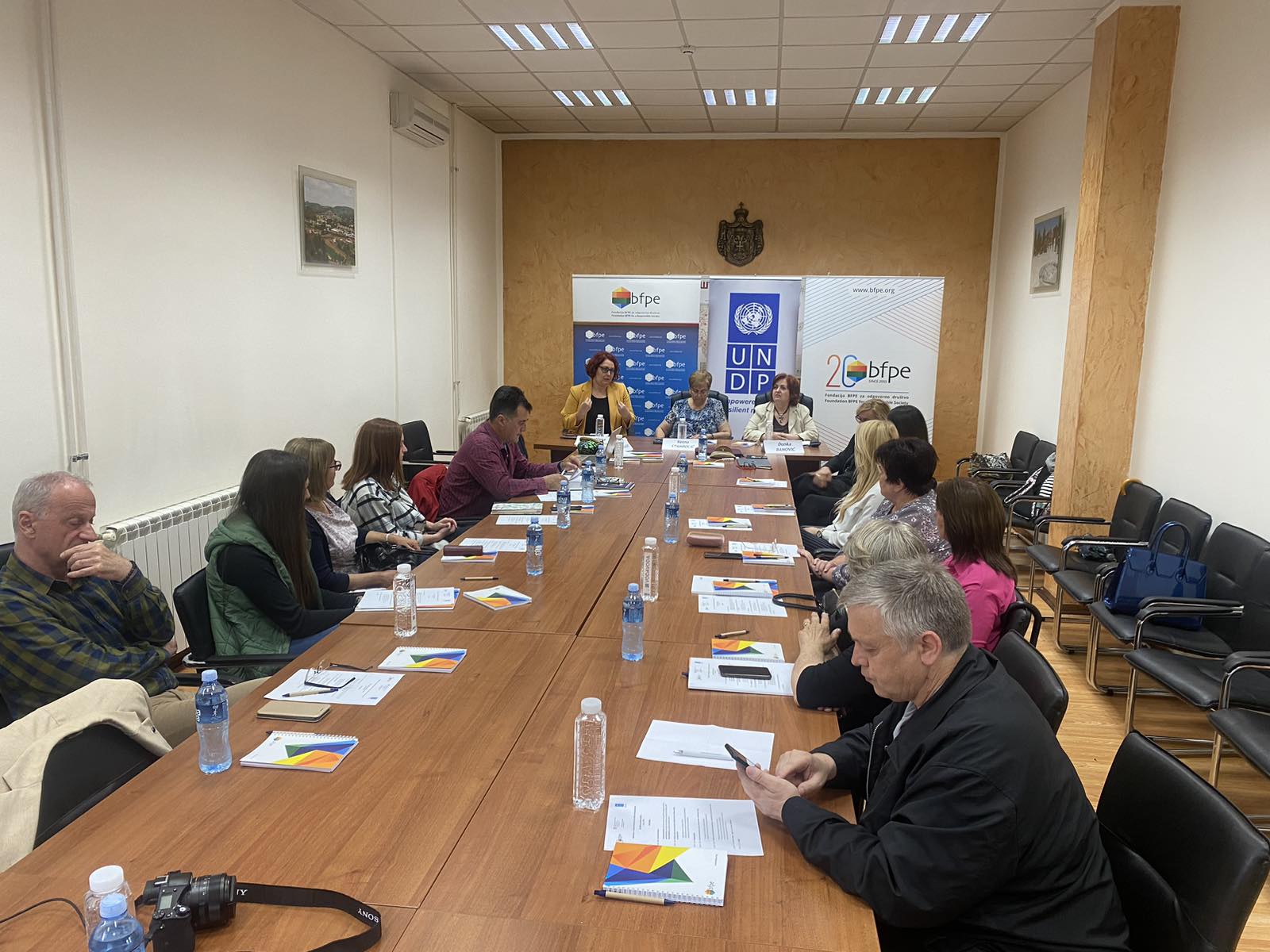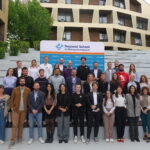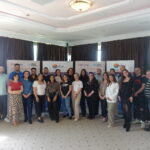Foundation BFPE for a Responsible Society organized a series of workshops on various aspect of gender equality in the municipality of Lučani in the period of June-October 2023, within the project: Strengthening Parliamentary Democracy and Inclusive Dialogue, a project supported by Swiss Development Cooperation and organized by UNDP in Serbia, with BFPE being one of the executive partners from civil society. Lučani is a small town in the Moravički district, South-West of Serbia, classified as an underdeveloped municipality. It is home to two major factories – the arms industry Namenska and the Maxima paint processing factory. In earlier years, the municipality was thriving with a well-educated population, mainly employed at Namenska. However, since the 2000s, Namenska has faced a decline, leading to a significant reduction in the population of the local community. Additionally, the whole municipality of Lučani (the town itself and the villages belonging to the municipality) is often affected by natural disasters, making it one of the most endangered municipalities in Serbia in that regard. In the last decade it has experienced six major floods, facing serious challenges in flood protection and dealing with deteriorating infrastructure destroyed by floods.
The series of workshops held in the municipality of Lučani was conducted in collaboration with the councilors and local CSOs, who acknowledged the necessity of creating and implementing a Local Action Plan on Gender Equality. The councilors approached us, seeking assistance with the LAP, as they were obligated by the new Law on Gender Equality, which now anticipates monetary fines for non-compliance at the local level. The law that outlined sanctions motivated the council members to find a solution and avoid paying fines. That’s why, having heard positive experiences from other cities, they approached us with the idea of helping them create a Local Action Plan for Gender Equality.
Initially, the councilors didn’t fully understand the need for norms that would regulate gender equality. They had the notion that equality of men and women had already been achieved and saw no need to advocate for it further. The legal obligation seemed imposed on them, and that there are other much more important issues their community is faced with. For example, they did not fully understand what gender-sensitive language entails and why it is important. At the beginning of the workshop series, the Speaker of the local Assembly (parliament) started the session by expressing reluctance towards adopting gender-sensitive language. She said that gender sensitive language is just a trend “imported from the West”, that she felt no obligation to use it and that she doesn’t believe that it reflects equality between women and men. It was clear that helping them to see things from a different angle and providing them a full argumentation that would change their deeply rooted opinions would be a tough job. We tackled this challenge carefully, sharing with them real stories on how women are doing in Serbia, backed by official data and real-life experiences. We opened a dialogue with them about the everyday real-life situations that women are facing in Serbia, and offered insights into the roles of women in politics, and decision making in general. During the workshops, they slowly began to open up, discussing their own problems within their community, issues faced by women in politics, and with each subsequent workshop we became closer to understanding why it is crucial for the everyday lives of women and men to be reflected in legislative norms and the local government budget. They slowly started to comprehend why gender equality is important for each of them and the entire community, and how a different approach to equal rights and responsibilities should impact on shaping local policies and their implementation.
Furthermore, they were encouraged to identify the priorities specific to their local community, by listing the problems which were crucial for the entire community, such as prostate cancer for men and cervical cancer for women. They addressed the problems with damaged roads and floods that recur every year. The open discussion helped them to identify their priorities, understand why it is important to permanently consider the female perspective. At the end of the workshop series, they made a big point about how crucial it is for everyone involved to sit down together and talk about the challenges and achievements in their own social environment. The participants of the workshops concluded that they needed to have regular meetings to discuss the problems and find solutions for their community. And one of their own conclusions was that they were not really talking to each other and did not have a regular communication among various local stakeholders and with citizens.
Following the trainings, it became evident that additional support would be necessary especially when it comes to gender-responsive budgeting and the development of a Risk Management Plan to effectively address violations of the principle of gender equality, as mandated by the Law. The participants of the workshops were budget beneficiaries (Center for Social Work, Cultural Center, Public Health Center, Public Communal Service, police, firefighters), the department responsible for budgetary matters, as well as members of the newly formed Commission and Council for Gender Equality. They shared their ideas, the methods they had been using so far, and how to collaborate most effectively in the future to implement gender-responsive budgeting in the municipality. Participants did not hesitate to point out the challenges they face and the resistance to change, but ultimately by the end of the workshops they realized the importance of aligning the budget with the measures that are needed to be efficiently implemented.
When it comes to adoption of the Risk Management Plan for the violation of gender equality principles, the participants openly discussed the challenges they face at work, especially women openly shared their negative experiences. One of the employees, for instance, spoke about facing workplace bullying and the feeling of an “empty desk syndrome.” The women openly discussed their negative experiences with sexual harassment at work, and they all agreed that these situations are real and need to be tackled through gender responsive policies. As a result, they concluded that as a result of this joint exercise (six two-day workshops) they now understand how Risk Management Plan for the violation of gender equality principles protects and preserves their rights and what are the steps that need to be taken to adopt this document.
Furthermore, at the conclusion of the workshop series in Lučani, a final event was held – a Public Hearing on the topic “Women in Emergency Situations.” During the hearing, participants had the opportunity to gain insights into the specific experiences of women through several presentations, the most outstanding ones by the long-serving director of the Red Cross (40 years in total in the Red Cross), the head of the Emergency Situations Headquarters, as well as the director and co-owner of the largest private factory in Lučani – Maksima, all of whom faced significant challenges in dealing with emergency situations, especially floods. The owner of Maxima factory shared the challenges they dealt with during the COVID-19 pandemic. Due to the information they gained from their business partners in Italy about the spread of the corona virus and the most serious health disaster they were faced with, the crises team she is heading listed all the vulnerable employees (those with chronic illnesses and pregnant women) and sent them home two weeks before the official declaration of the pandemic in Serbia. Plus, they acquired the necessary protective devices and trained the employees how to behave in this new situation “because the factory cannot stop working”. A great example of corporate responsibility in this small community! It was also highlighted that women played a crucial role in dealing with the situations created by the pandemic, as they are working in positions constantly under duress, be it in public services or various caring professions.
It could be said that the municipality of Lučani is an exemplary case and a good practice study, having in mind that it had no prior documents related to gender equality, no Action Plan for Gender Equality, and no established gender related bodies (Gender Eguality Commission and Gender Equality Council and Person Responsible for GE). The councilors from this municipality started from scratch and successfully worked step by step to create those bodies and legally required documents. This serves as a best practice example because it demonstrates that any municipality, if approached in the right way, possesses the capacity or can build the capacity to create these documents and subsequently implement gender responsive policies. Between the workshops, throughout the entire process, the BFPE team had ongoing consultations with the local councilors from the municipality of Lučani. Moving forward, we are planning to keep supporting their development and fully back their efforts to design and execute gender-related policies. In the process of intensive learning and dialogue, they gained the necessary knowledge and understanding on gender equality. Together, we outlined all the steps they need to take to create and put into action gender-related policies. However, they also encountered obstacles in selecting and collecting data for the Local Action Plan. It proved challenging for them, and it still is, to use all this data to align with the local budget for the effective implementation of gender sensitive measures. The entire process reaffirmed that local municipalities have a long journey ahead to reach their goals, and they need support on this path. But it also proved that important steps can be achieved if support is provided through sincere dialogue, as the main instrument in building trust and mutual respect among the parties involved in the process.













